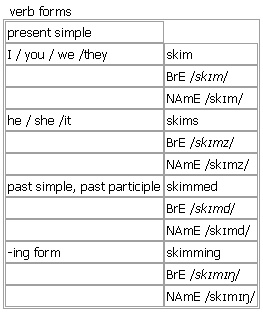 skim
skim

skim [skim skims skimmed skimming] BrE [skɪm] NAmE [skɪm] verb (-mm-)
1. transitive to remove fat, cream, etc. from the surface of a liquid
•~ sth off/from sth Skim the scum off the jam and let it cool.
•~ sth Skim the jam and let it cool.
2. intransitive, transitive, no passive to move quickly and lightly over a surface, not touching it or only touching it occasionally; to make sth do this
•~ along/over, etc. sth We watched the birds skimming over the lake.
• (figurative)His eyes skimmed over her face.
•~ sth The speedboat took off, skimming the waves.
• (figurative)This report has barely skimmed the surface of the subject.
•~ sth across, over, etc. sth (BrE)Small boys were skimming stones across the water.
see also ↑skip
3. intransitive, transitive to read sth quickly in order to find a particular point or the main points
•~ through/over sth He skimmed through the article trying to find his name.
•~ sth I always skim the financial section of the newspaper.
4. transitive ~ sth (from sth) (informal)to steal small amounts of money frequently over a period of time
•She'd been skimming money from the store's accounts for years.
5. intransitive, transitive ~ (sth) to illegally copy electronic information from a credit card in order to use it without the owner's permission
•It is estimated that skimming now accounts for almost 50% of credit card fraud.
Derived: ↑skim somebody off
Verb forms: 
Word Origin:
Middle English (in the sense ‘remove scum from (a liquid)’): back-formation from skimmer, or from Old French escumer, from escume ‘scum, foam’.
Example Bank:
•We skimmed across the water in a small sailing boat.
•I scanned/skimmed the list until I found my name.
|
|
